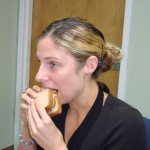
If you think about it, your digestive system is pretty weird. Amazing, but weird. Digestion is the rather complicated process of breaking down the food we eat into energy and nutrients, which then get absorbed into our bloodstream and distributed throughout our body so we achieve and maintain good health.
Digestion usually starts with your eyes or nose. “Mmm, that looks or smells yummy,” to which your brain and stomach respond, “Send in the good stuff, gurgle, gurgle.”
Next – take a bite. Your teeth break up the big pieces into smaller pieces. Big pieces have a hard time digesting, so chew well and enjoy the taste of your food. Saliva with digestive enzymes enters to start breaking down your food even more, making digestion much easier on your tongue, esophagus, stomach, and small intestine. Next, your tongue lifts the food (bolus) back to your esophagus so you can swallow. With more saliva and a little muscle contraction – down it goes to the stomach.
Your stomach has quite a volatile job. Strong muscle contractions have enough force to break down food further and highly acidic stomach juices are released to begin digesting proteins (amino acids) and fats (fatty acids). Once the stomach walls have churned and the juices have turned the food into a thick, juicy mass called chime, the stomach’s wavelike contractions push the food to the small intestine.
The small intestine – 20 feet of coiled contracting muscles that push food along – is where your body starts to pull out those nutrients it needs. More, but different, digestive juices come in to help shove the chime along. Here, specialized cells grab all the nutrients and energy and send them along to the rest of your body. Everything else that can’t be digested moves to the large intestine.
The large intestine, or colon, absorbs all of the water and squeezes the leftovers into clumps of waste, usually called feces, but you may have heard of a number of other terms. Finally, more muscle contractions push the feces out of your body – and digestion is finally done!
Weird but true.
Posted: August 25, 2015
Category: Health & Nutrition, WORK & LIFE
Tags: Happens, Living Well In The Panhandle


